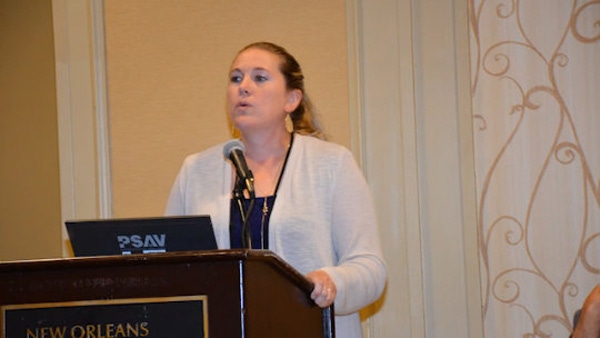
EPA has published new Worker Protection Standard rules that will require growers to train their employees more frequently and sooner rather than later when they’re first hired, a pesticide product safety specialist says.
The new WPS rules will also preclude the hiring of pesticide-handling workers under the age of 18 unless they are “immediate-family” members, according to Kim Pope Brown, pesticide safety education coordinator for the LSU AgCenter.
Ms. Brown gave farmers and other industry members an update on the Worker Protection Standard revisions that were published in 2015 during a session aimed at addressing environmental and labor issues at the Louisiana Farm Bureau Federation’s annual convention in New Orleans.
Some of the rules go into effect Jan. 1, 2017, and others on Jan. 1, 2018, but Ms. Brown and her counterparts with other state Extension Services are working with growers now to help them prepare for implementing the revisions before they become enforceable.
“Under the new rules, we will now be required to train workers and our handlers annually, rather than every three years,” she said. “We also no longer have a grace period for new workers. Previously, we had a five-day grace period so you could put someone to work and train them within five days. Now they will have to receive training before they perform worker or handler tasks.”
Annual training is an important new requirement. “If you train one of your employees today on June 24 then you must train them again on June 24, 2017,” she said. “That’s something growers have not had to do in the past.”
More extensive recordkeeping
More extensive recordkeeping will be required, particularly for the training materials growers use, she said. “You also have to keep the training materials on file for two years after you do that training.”
Growers will also be required to take a “Train the Trainer” course to make sure they’re covering all of the information needed to adequately prepare their employees for handling, applying or being exposed to pesticide residues.
“Something else to keep in mind is that if the restricted entry interval or REI for that pesticide is greater than 48 hours, then you need to make sure that you do an outdoor posting with the “Danger-Please Keep Out-No Entrance sign with the hand up ,” she said. “That sign will need to be put up to make sure everyone knows there has been an application.”
A new minimum-age requirement of 18 for workers and pesticide handlers will be enforced except for what are referred to as “immediately family members.” EPA has published a lengthy list of relatives who qualify for the exemption:
“The immediate-family exemption has been expanded to include not only immediate family but also spouse, parents, step-parents, foster parents, father-in-law, mother-in-law, children, step-children, foster children, sons-in-law, daughters-in-law, grandparents, grandchildren, brothers, sisters, brothers-in-law, sisters-in-law, aunts, uncles, nieces, nephews and first cousins.
“That will be helpful to producers who have family members involved in their operations,” she said.
Fit-testing for respirators
The revised WPS rules also include new language on respirators. “EPA references a subset of OSHA regulations on respirators to ensure that employees who must wear respirators are fit-tested, have a medical evaluation and have training on how to use the respirators appropriately and safely,” Ms. Brown noted.
“This is so they know what cartridges they need, and they are actually qualified to wear those respirators.”
Certified crop advisers and other consultants who are scouting crops before a restricted entry interval has been completed must ensure they or their employees are wearing the personal protective equipment required by the label for the pesticide that has been applied.
Under the revised decontamination rules, farmers must have one gallon water on hand for each worker present in an area being sprayed and three gallons of water for each pesticide handler. The containers of the water must be available at the beginning of the day.
“Before this revised rule, there was no minimum requirement for how much water had to be available,” she said. “Now there is.”
An “Application Exclusion Zone” is a new term for pesticide applications. “Growers are now required to keep a ‘halo’ around a piece of application equipment,” she said. “You must prohibit workers who have not been properly trained in handling pesticides from entering that application exclusion zone for aerial application, fumigation, and ground rig applications, as well.”
Product labels in hand
Growers must also provide emergency assistance promptly if there is a potential pesticide exposure. “Growers also need to have copies of the label and the SDS to make sure medical personnel know what kind of product the worker was exposed to, how they were exposed and what to do to counteract the effects,” she said.
“Again, full implementation is not required until Jan. 1, 2018, but we need to be ready to comply with almost all provisions by Jan. 1, 2017. The new safety training requirements and the new Keep Out poster for REIs are the only things that won’t have to be implemented prior to Jan. 1, 2018.”
She says EPA has indicated they will work with farmers initially to help them comply with the new WPS rules. State departments of agriculture, such as the Louisiana Department of Agriculture and Forestry, and EPA will be responsible for enforcing the rules.
“It is a high priority,” she said. “All of our departments of agriculture, Mississippi, Arkansas, Louisiana and all over the country are making it a high priority. All of the Extension Services will be working to help farmers understand the rules as completely as possible.”
To learn more about the new WPS rules, visit https://www.epa.gov/pesticide-worker-safety/revisions-worker-protection-standard.
About the Author(s)
You May Also Like






